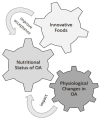Considerations for the Development of Innovative Foods to Improve Nutrition in Older Adults
- PMID: 31195630
- PMCID: PMC6627386
- DOI: 10.3390/nu11061275
Considerations for the Development of Innovative Foods to Improve Nutrition in Older Adults
Abstract
The population of older adults is growing globally. This increase has led to an accumulation of chronic illnesses, so-called age-related diseases. Diet and nutrition are considered the main drivers of the global burden of diseases, and this situation applies especially to this population segment. It relates directly to the development of coronary heart disease, hypertension, some types of cancer, and type 2 diabetes, among other diseases, while age-associated changes in body composition (bone and muscle mass, fat, sarcopenia) constitute risk factors for functional limitations affecting health status and the quality of life. Older adults present eating and swallowing problems, dry mouth, taste loss, and anorexia among other problems causing "anorexia of aging" that affects their nutritional status. The strategies to overcome these situations are described in this study. The impact of oral food processing on nutrition is discussed, as well as approaches to improve food acceptance through the design of innovative foods. These foods should supply a growing demand as this group represents an increasing segment of the consumer market globally, whose needs must be fulfilled.
Keywords: acceptability; aging; food; nutrition; older adults.
Conflict of interest statement
The authors declare no conflict of interest.
Figures
References
-
- World Health Organization Global Health Observatory Data Repository. [(accessed on 3 April 2019)]; Mortality and Global Health Estimates. Available online: http://apps.who.int/gho/data/node.home.
-
- Global Nutrition Report. From Promise to Impact: Ending Malnutrition by 2030 Independent Expert Group, Washington, DC, USA. [(accessed on 30 March 2019)]; Available online: http://www.ifpri.org/publication/global-nutrition-report-2016-promise-im....
-
- Kaiser M.J., Bauer J.M., Rämsch C., Uter W., Guigoz Y., Cederholm T., Thomas D.R., Anthony P.S., Charlton K.E., Maggio M., et al. Mini Nutritional Assessment International Group. Frequency of malnutrition in older adults: A multinational perspective using the mini nutritional assessment. J. Am. Geriatr. Soc. 2010;58:1734–1738. doi: 10.1111/j.1532-5415.2010.03016.x. - DOI - PubMed
MeSH terms
LinkOut - more resources
Full Text Sources
Medical


